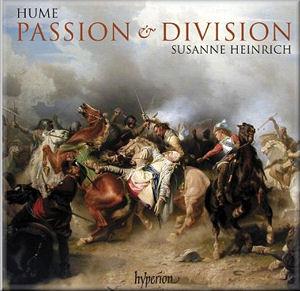 |
 |
|


alternatively
CD: AmazonUK
AmazonUS
|
Tobias HUME (c.1579-1645)
Passion & Division -The First Part of Ayres—Captain Humes
Musicall Humors (1605)
1. Loves Pastime [6:54]
2. A Jigge [1:58]
3. Harke, harke [2:50]
4. Now I come [2:14]
5. Rossamond [4:04]
6. Touch me lightly [2:38]
7. The Duke of Holstones Almayne [2:24]
8. Souldiers Resolution [5:28]
9. I am melancholy [7:06]
10. Tickell, tickell [2:14]
11. A French Ayre [1:35]
12. Deth [7:30]
13. Life [1:51]
14. The Spirit of Gambo [3:44]
15. Tinckeldum, twinckeldum [1:58]
16. Captain Humes Pavan [9:03]
17. A Souldiers Galliard [1:44]
18. Loves Farewell [5:19]
Susanne Heinrich (viola da gamba)
rec. 23-25 April 2009, St. Andrew’s Church, Toddington, Gloucestershire
HYPERION CDA67811 [70:34] 
|
|
|
I wanted to like this disc much more than I do. I’ve been a fan of Tobias Hume’s music ever since I first heard Jordi Savall’s recording of a selection of these solo gamba pieces back in 1984. That disc was Musicall Humors, which remains, in my opinion, the finest of the all-too-few recordings of Hume’s wonderful music. Hume recordings are rare enough that each one makes me stand up and take notice.
It’s almost an exaggeration to say, as the liner-notes to this disc state, that “Relatively little is known of Tobias Hume”. Aside from his music, hardly anything remains to tell us of his life, which was contemporary of that of another great artist who left few tracks but some wonderful published works. In some ways, this is for the better; we can listen to Hume’s music unburdened by any history of his life.
Heinrich’s recording covers the main works from Hume’s Musicall Humors; it duplicates much of what Savall played on his recording, but with the extended time of the CD, has room for much more. Savall’s disc was 52 minutes long; Heinrich plays for 70 minutes.
What disappoints me here is that Heinrich seems to want to turn the music into something precious. Gone are the rough edges of Savall, the boisterousness and vigour of his attacks on the music, and his energetic bowing. With Heinrich, all is smooth and sweet, and even her choice of an opening piece - Loves Pastime, played almost like a bit of ambient music - paints this disc as one of contemplation. Savall’s disc opens with Captain Humes Pauin, the longest track on either disc. Heinrich plays it at over 9:30 longer than Heinrich. All of Savall’s double-stops and chords are rough and full of luscious-sounding near-dissonances; Heinrich’s reading sounds too clean, too perfect, her playing too smooth.
Compare the piece Deth, a deeply moving work. Where Savall is not afraid to put pressure on his bow, especially in the subtle double-stops and riffs that give the piece character, Heinrich’s playing is more withdrawn, more subtle.
Then again there’s A Souldiers Resolution, played by Savall as though he were whipping off an improvisation. It comes through with Heinrich as overly fluid and smooth, with chords that lack the rich colours and spontaneity that Savall offers.
It’s clear that not only does the playing give this impression, but also the instruments used. Heinrich’s seems much less expressive, with less bass. The recordings themselves also differ with Heinrich recorded from a distance while Savall is in your face. All this adds up to the same music, expertly played by two performers, giving totally different impressions.
Heinrich plays the final piece, Loves Farewell, plucking it from beginning to end, again turning this rich, textured piece into one of dainty beauty. While there’s no valid reason to pluck it, neither is there any reason why one shouldn’t, as plucking was used a lot with lyra viol music. But it closes this disc on a tone that belies the music; Hume’s music doesn’t sound right, to me, with this dainty style.
To be fair, I may have the Savall recording deeply imprinted on me, as hearing it when I did was so important to my musical experience. But I have played this music as well, during a brief love affair with the viola da gamba. It’s not virtuosic in any way, and even with my limited experience playing string instruments, I was able to saw out decent renditions of these pieces. Yet it sounded much better played with the chutzpah that Savall used rather than the smoothed-down style as played by Heinrich. This is a choice, and one that the performers made consciously; Heinrich is a master at her style of playing. It’s just that, for this music, that style doesn’t do it for me. If you’ve never heard Hume’s music, perhaps this disc will grab you and get you interested.
Kirk McElhearn
|
|












